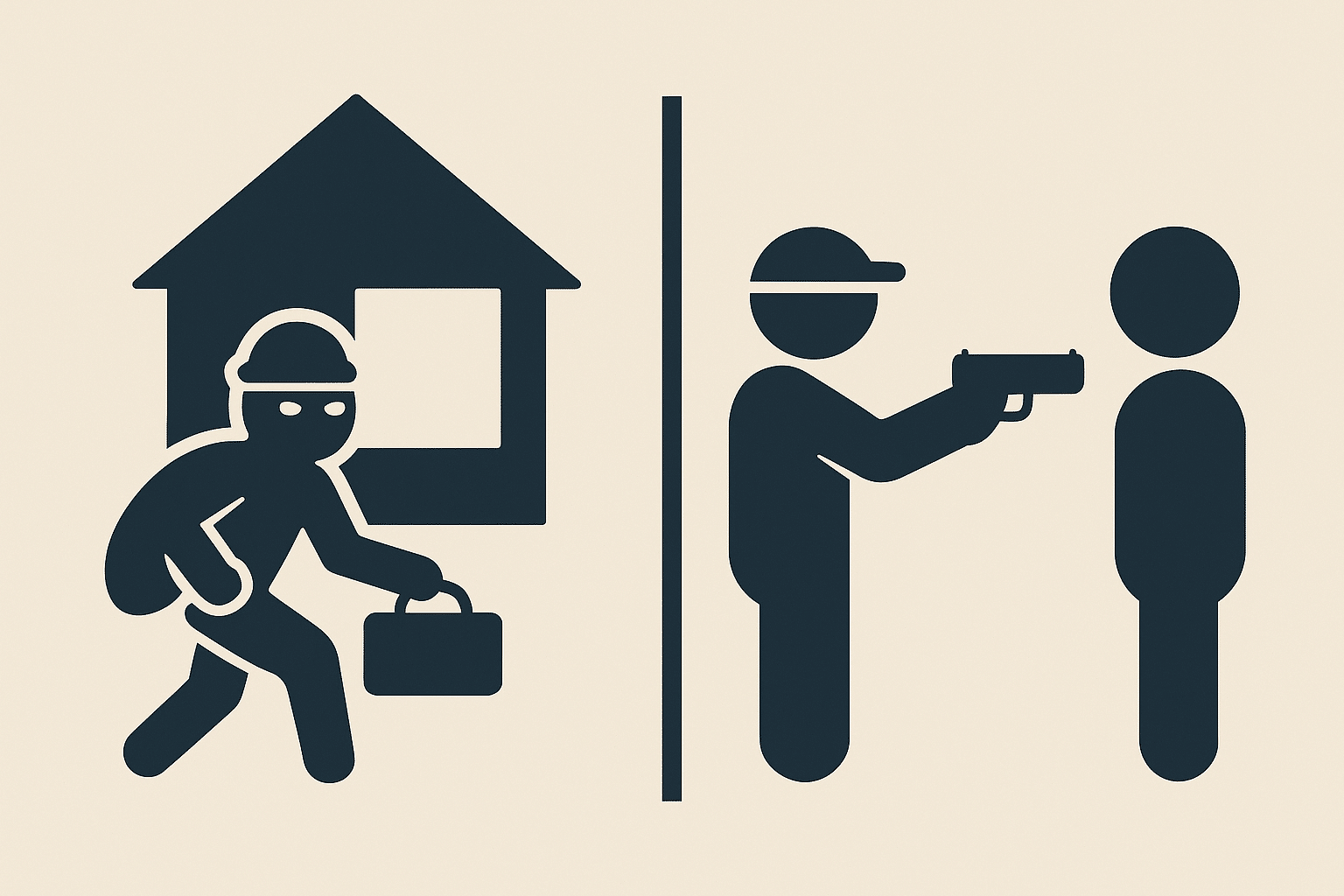
If you’re facing criminal charges in Maryland, or trying to understand what a loved one has been accused of, the difference between burglary vs robbery can be confusing. Although these terms are sometimes used interchangeably in casual conversation, they are two distinct crimes under Maryland law—each with its own legal definition, required elements, and potential penalties.
In this post, we’ll break down the difference between burglary and robbery, explain how Maryland law treats each offense, and outline what you should do if you’re facing either charge in Southern Maryland.
What Is Burglary in Maryland?
Burglary is a property crime. At its core, burglary involves entering a building without permission with the intent to commit a crime inside. Contrary to popular belief, burglary does not require theft or violence—only unlawful entry and criminal intent.
Key Elements of Burglary:
- Unlawful entry into a dwelling, storehouse, or other structure
- Intent to commit a crime (usually theft or a violent offense)
- Entry can occur with or without actual breaking (e.g., walking through an unlocked door)
Maryland Burglary Degrees:
Under Maryland Criminal Law, burglary is broken down into four degrees:
- First-Degree Burglary (§ 6-202): Breaking into someone’s home with the intent to commit a theft, crime of violence, or arson. Penalty: up to 25 years in prison.
- Second-Degree Burglary (§ 6-203): Breaking into a storehouse with intent to steal a firearm or commit a crime. Penalty: up to 15 years, or 20 years if a firearm is targeted.
- Third-Degree Burglary (§ 6-204): Breaking into a dwelling with intent to commit any crime. Penalty: up to 10 years.
- Fourth-Degree Burglary (§ 6-205): A catch-all charge that includes unauthorized entry into a building or being found in a building with burglary tools. Penalty: up to 3 years.
Burglary is generally considered a felony in Maryland, except for some fourth-degree charges.
What Is Robbery in Maryland?
Robbery, on the other hand, is a violent crime. It involves taking property directly from another person through force, threat, or intimidation.
Key Elements of Robbery:
- Taking property from a person
- Use of force or threat of force
- Intent to permanently deprive the victim of the property
In many ways, robbery is theft with a violent twist. Unlike burglary, it doesn’t require breaking into a building—it happens face-to-face.
Maryland Robbery Charges:
Maryland recognizes two primary forms of robbery:
- Robbery (§ 3-402): Punishable by up to 15 years in prison.
- Armed Robbery (§ 3-403): Involves use or threat of a dangerous weapon. Punishable by up to 20 years.
Attempted robbery and carjacking are closely related offenses, and they carry similar or even harsher penalties.
Burglary vs. Robbery: A Quick Comparison
| Crime | Burglary | Robbery |
|---|---|---|
| Target | A building or structure | A person |
| Action | Unlawful entry with intent to commit a crime | Taking property by force or threat |
| Violence | Not required | Required (force or intimidation) |
| Examples | Breaking into a house to steal jewelry | Mugging someone at knifepoint |
| Penalties | Up to 25 years (depending on degree) | Up to 20 years (if armed) |
Why the Distinction Matters in Criminal Defense
Understanding the difference between burglary and robbery is critical if you’re facing charges. Prosecutors often stack charges or overcharge based on the facts of the case. In Southern Maryland—including Charles County, Calvert County, St. Mary’s County, and Prince George’s County—law enforcement agencies take both offenses seriously and often seek the harshest penalties possible.
A strong defense may involve challenging the alleged intent in a burglary case or disputing the use of force in a robbery case. Surveillance footage, witness testimony, and evidence handling can all make or break your case.
Charged With Burglary or Robbery? You Need a Criminal Defense Lawyer Now.
If you’ve been arrested or charged with burglary or robbery in Southern Maryland, don’t wait to get help. These are serious felonies that can lead to prison time, a permanent criminal record, and loss of your rights.
At Southern Maryland Criminal Defense, attorneys Jeremy Widder and Kathryn Batey have experience defending clients against both burglary and robbery charges across Charles, Calvert, St. Mary’s, and Prince George’s Counties. He knows how to examine the evidence, push back on the State’s narrative, and fight for the best possible outcome.
👉 Schedule your confidential consultation now: Contact Us
